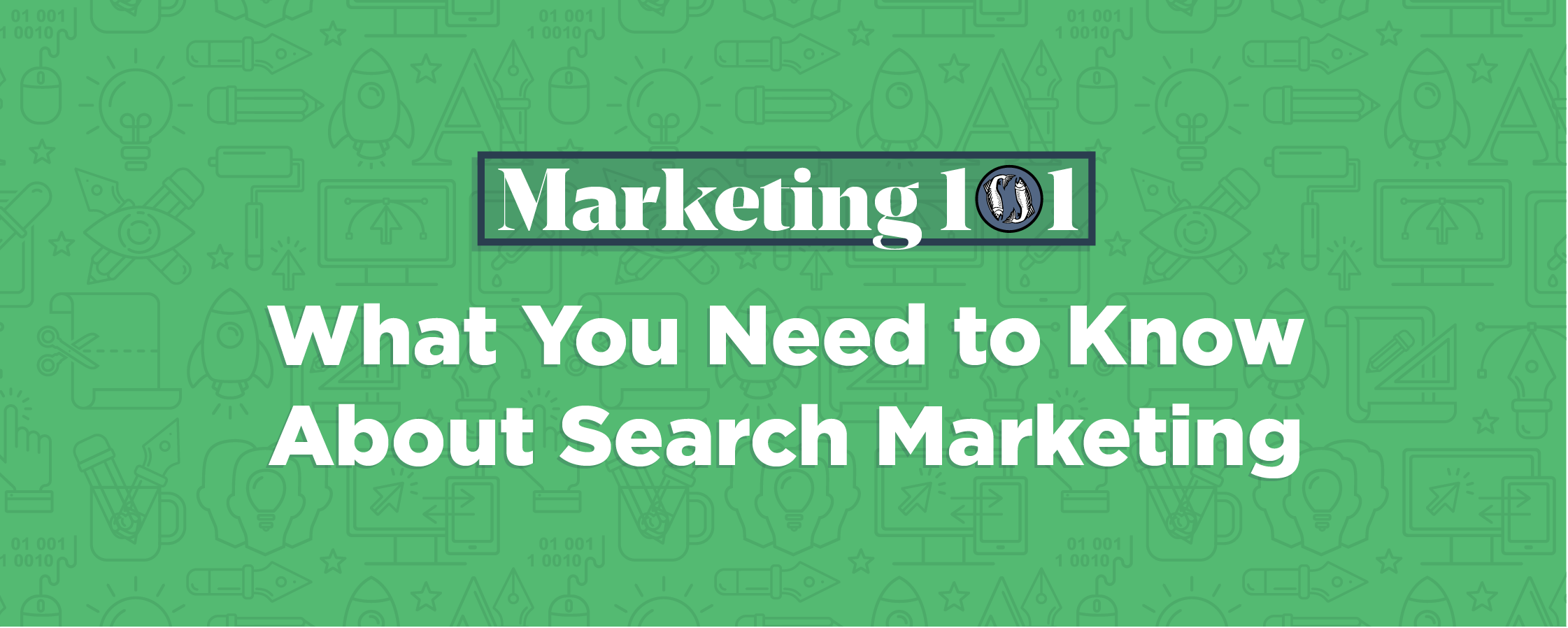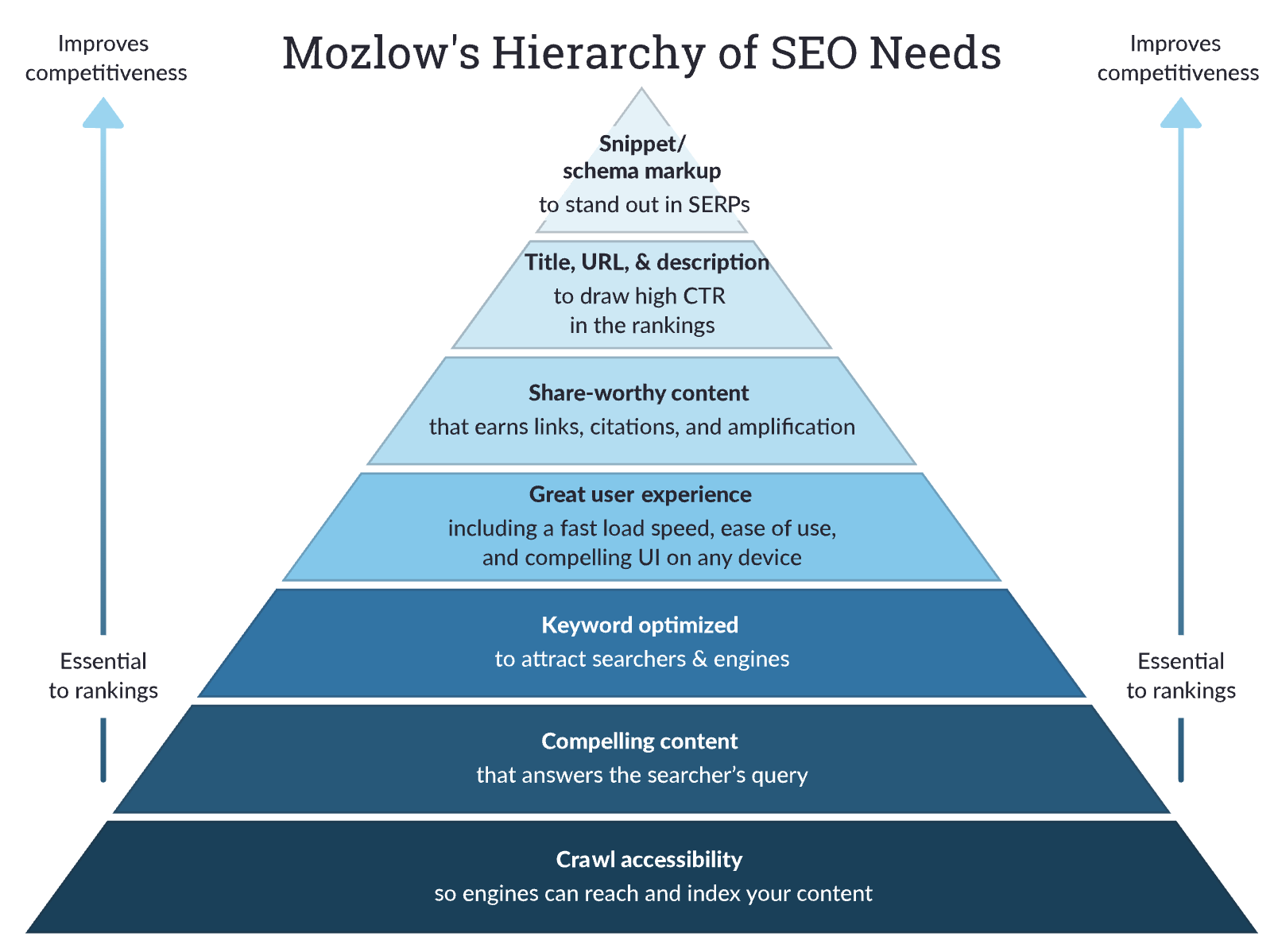- Marketing 101

The importance of search marketing has skyrocketed, so much so that it’s become one of our main offerings. Prospective clients often come to us expressing that they know they need search but have no idea how to start.
Truthfully, search marketing is challenging; different opinions on “best practices” can be confusing, implementation is often technical in nature, search engine algorithms are ever-changing, and “success” is relative and typically long-term.
Knowing that people are often apprehensive about starting with search for these reasons, we thought it was time for a primer on what it is, why it’s so important, and where to start.
WHAT SEARCH MARKETING IS
Search marketing is the umbrella term for two distinct marketing tactics: search engine optimization (SEO) and search engine marketing (SEM).
Why are SEO and SEM important? Because they help you get seen in search engines, which are often the first method people use to find the product or service they’re looking to purchase.
How Search Engines Work
Before we dive into SEO and SEM, here’s some foundational information about search engines.
Moz calls search engines “answer machines.” Google, Yahoo, and Bing are probably the search engines you know best, but many more exist. There’s Baidu, Yandex, Duck Duck Go . . . even YouTube is technically a search engine.
As an internet user, you know the basics of how search engines function: You type a query into the search bar and press enter, then your search engine of choice spits out a list of web page links that you can click for the answer.
Here’s what happens behind the scenes of this seemingly simple question-and-answer process. Search engines “index” (collect and store) information from web pages across the internet. Then they determine which web pages in their database to serve in response to search queries. (Fun fact: Since search engine results are pulled from a search engine’s database, you’re not actually seeing the live, real-time versions of the web pages in the search results. You’re seeing the web pages as they were when the search engine last indexed them. However, search engines are constantly “crawling” the web, searching for new and updated information to keep their archives relatively up-to-date.)
Not only do search engines have to decide which web pages are relevant to which search keywords or phrases, but they also have to figure out the order in which to list (or “rank”) the pages. They use complex and proprietary algorithms to do so.
ABOUT SEO
Search engines—like any business—want to provide a good experience for their users, so they do their best to put the most relevant, trustworthy, safe, authoritative, and technically-sound web pages first in search engine results pages (SERPs). That means that for your website to rank well for a query, it has to be high quality, relevant, trustworthy, safe, authoritative, and technically sound. (Note that these are just a few generalized ranking signals. Search engines have literally hundreds of specific ranking factors.)
SEO is the organic (unpaid) method for improving search rankings. By optimizing site design, content, and technical performance, you can work to improve your standing in search results. The goal is to rank in one of the top spots on the SERP, or at least on the first page, because most people don’t look beyond the first one or two results pages. Google displays ten results (“blue links”) on each SERP.
As Moz puts it, “although search engines have become increasingly sophisticated, they still can’t see and understand a web page the same way a human can. SEO helps the engines figure out what each page is about, and how it may be useful for users.”
So how does one “do SEO”? There are three areas to optimize: Technical, on-page, and off-page. Technical SEO involves updates that make it easier for search engines to index a site and that improve the user experience. On-page SEO involves content and links. Off-page SEO deals with links and other external signals.
Check out our article “What is SEO, and how does it work?” for a more in-depth look at these factors.
But, as many SEOs will tell you, a well-optimized site won’t automatically rocket your site to the number one ranking, bring millions of visitors to your site, and make you a billionaire. You’ve got to also earn attention and traffic to your site, which involves content marketing and effective advertising. And those are a whole ‘nother ball game . . . Bottom line: SEO is a long-term strategy, and it should be part of a broader marketing strategy.
ABOUT SEM
While SEO is about achieving a good ranking through unpaid tactics, SEM (a type of pay-per-click, or “PPC” advertising) lets you “skip the line,” so to speak. It is a paid tactic for getting seen in SERPs through ads.

Here you can see two paid SEM ad placements (marked “Ad”) below organic results. (SEM ads can appear at the top or bottom of the SERP.)
You may be wondering why everyone doesn’t just pay for SEM and forget about all of the work that goes into good SEO. There are plenty of reasons! Think of SEM as a way to boost traffic and revenue, as long as you’re paying to keep ads running. SEO is a longer-term strategy for awareness and brand building. Paid ads may drive a user to your site, but if their experience there is bad, you’ve just wasted money on their click. Search engines don’t want to send people to bad sites, so your ad performance can even be negatively impacted. People may also be wary of search ads, knowing that companies have paid to appear at the top of the page, and opt to click on one of the first organic results instead.
A strong, SEO-optimized site is the backbone of a good search and web presence. SEM is an effective tactic for driving more traffic to an optimized site.
WHERE TO START WITH SEARCH MARKETING
That was a lot of information. You probably want to know where to start.
As we just mentioned, first things first, you need an SEO-optimized website. Below, Moz’s “Mozlow’s Hierarchy of SEO Needs” shows you essentials to start with and then how to improve competitiveness.

Source: https://moz.com/beginners-guide-to-seo
As you can see, technical performance is key. Search engines need to be able to crawl your site. Then, you need good content that answers search queries relevant to your business. It needs to be optimized with keywords so search engines and users understand what it’s about. To be competitive, you need a great user experience, content that will go the distance, meta tags, and schema markup.
Once you have a solid site, bring some paid ads into the mix. (As a general rule of thumb, make sure you’ve done everything through “Great user experience” on the pyramid before you start driving lots of traffic to your site.)
Creating a solid SEM strategy takes . . . well . . . strategy. For truly effective ads, you must research keywords, create specific landing pages, and set up ads and conversion tracking. Check out Neil Patel’s “Google AdWords Made Simple: A Step-by-Step Guide” for more info. SEM ads should also be carefully monitored and regularly optimized.
NEXT STEPS?
We just shared a lot of search marketing fundamentals. Our goal was to give you a strong baseline understanding of search marketing so you can pursue next steps. If you’d like more in-depth information or hope to begin SEO work yourself, check out “The Beginner’s Guide to SEO” from Moz.
But here’s what we recommend, especially if all of the information in this article was overwhelming: Get professional search marketing help. Search marketing is not only complex and technical; it is an area in which accidents can cause actual, lasting damage to your web rankings.
Many blogs out there perpetuate the myth that anyone can do SEO. But remember, it’s a profession! Sure, we think you’re great and that you could probably do some solid work, but do you have the time? The desire to learn this whole new skillset? Will your work be as good as an SEO expert’s right off the bat? With search marketing, there’s really no time to waste. The landscape gets more competitive every day. So, if you can make room in the budget, we promise enlisting the help of an experienced search marketing professional will pay dividends.
CONCLUSION
With the proper strategy, search marketing can be an incredibly powerful tool. Really, it’s an essential piece of a modern digital strategy. We hope the info in this article has been helpful. We invite you to reach out with any questions you may still have about search marketing or developing a search strategy for your organization.
Be sure to check out more Marketing 101 content and subscribe to be notified right away when new content is released!
Remember, you can always submit questions for us to cover!
SHARE IT!
-
Marketing 101
Marketing 101: How to Make Social Marketing Work for You
-
Marketing 101
Marketing 101: Why You Need Personas + How To Create Them




